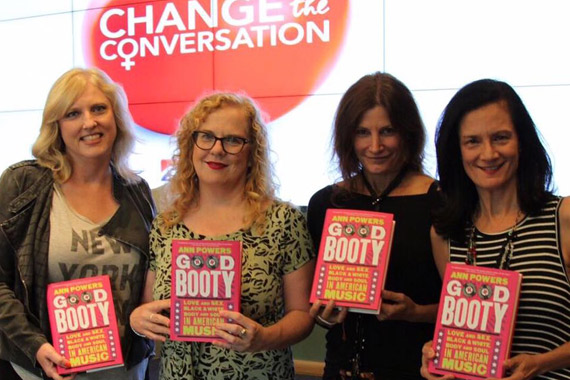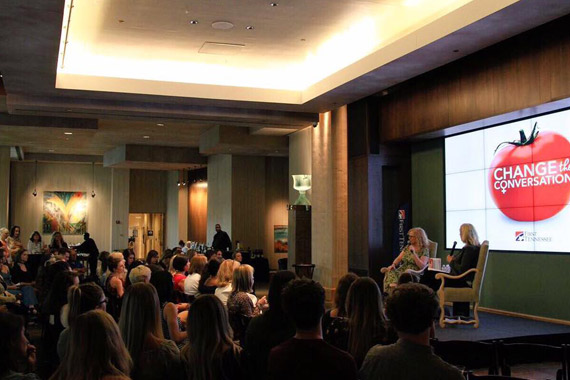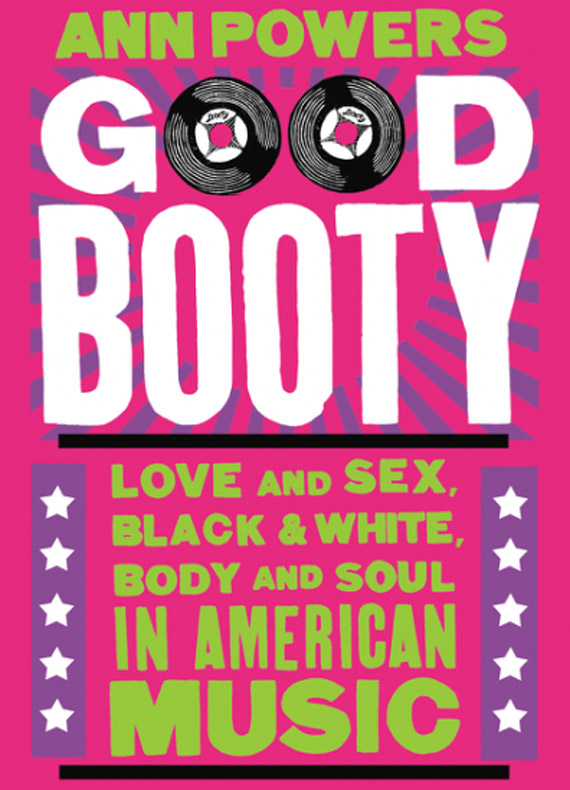

Pictured (L-R): Beverly Keel, Ann Powers, Tracy Gershon, Leslie Fram
First Tennessee Bank sponsored Change the Conversation’s August program at Nashville’s BMI on Aug. 29, featuring reporter and author Ann Powers.
Powers’ latest book Good Booty: Love and Sex, Black and White, Body and Soul in American Music was the feature of the program, which was led by the organization’s co-founder Beverly Keel.
“I’ve always been compelled towards music because it gave me pleasure; it made me feel free,” Powers told Keel. “I wanted to think hard about what that meant—how music helps us feel more connected to each other and how that experience of music has helped shape conversations about our bodies and things related to our bodies, like sexuality, eroticism, romance and love.
“I wanted to get beyond easy assumptions, that Rock & Roll is about sex. I wanted to know: What does that mean? How did that work in gospel music in the 1930s? How did it work in the 1980s when America was dealing with HIV/AIDS?
“I also wanted to highlight the stories of LGBTQ people, of women and people of color because that is the heart and soul of our American music heritage. Often times those stories are shunned to the side or hidden in plain sight.”
Powers has long spoken to those unsung legacies that have had a tendency to become lost or forgotten.
“When Evelyn McDonnell and I edited Rock She Wrote, we made it a point to include material from teen magazines and fashion magazines,” continued Powers. “That is music writing too and may have been forgotten. Just ask Merry Clayton in 20 feet from Stardom. When you listen to music from that era, it’s Merry Clayton you remember as much as Mic Jagger. So why isn’t she considered a co-author? Why is it that interpreting a song is not a form of authorship? It’s usually women who are interpretive singers. There’s lots of ways the woman’s position is undervalued and it’s important to celebrate the position where it’s thrived.”
Change the Conversation was formed by Tracy Gershon, Keel and Leslie Fram in 2014 to help create an even playing field for women in country music. The organization funds research and presents a platform where music business leaders address the opportunities and challenges in their segments of the industry. Other music leaders who have spoken to Change the Conversation include Reba McEntire, Wanda Jackson and Sara Evans.
Keel continued the conversation with Powers, some of which is highlighted below.
 Keel: How did the title come about?
Keel: How did the title come about?
Powers: For a long time the book had a different title: Rock Me With A Steady Roll, from a 1920s blues song, “My Daddy Rocks Me With A Steady Roll.” My editor thought that title may be too long, or people may not know the reference and asked me to think of a different title. I was sitting at my home office and I looked around my office and my eyes went right to Little Richard’s biography, and I thought, “Little Richard, Good Booty,” because those were the original lyrics to “Tooti Frutti.” The title just came to me straight from Little Richard.
What was the research process like?
I started in 2011, wanting to write about music and sexuality for years. I gave a talk that year at the Rock & Roll Hall of Fame called Rock & Roll Started With The Shimmy. One important thing I wanted to do with this book is to show how dancing is as important to music in this country as anything else. A woman dancing is as important as a man playing a guitar solo.
I really did this based on archival research at libraries, including MTSUs Center for Popular Music, Fisk, Rock & Roll Hall of Fame, the Lincoln Center Library in New York, the Schaumburg Library and the Tulane Jazz Archives.
Talk about sex in country music.
Historically, country has told incredible stories about love and sex and domestic life: marriage. Every country song about the fire going out is about sex, not about your stove. Country music is attached to a bigger world where certain values have historically included feminine modesty and decorum. But then on the other hand we have Dolly [Parton]. She’s our ray of light who has always presented herself as a sexual woman who is a badass in every single way.
How are the changing demographics influencing the music that is being made and becoming successful?
I lived in Alabama for six years. When I first heard Sam Hunt I thought, that’s like every undergraduate at the University of Alabama. Truly, that is what people want to hear in Southern college towns: country and hip hop. From early 90th century New Orleans, it’s always about music coming together.
There’s always the dilemma of celebrating the female artist or executive, but there’s almost always an asterisk with them perhaps perceived as different, or less than. I know sometimes as a female journalist, you’re tasked with writing about the female artist. Talk about celebrating female artists.
We face a paradox as women. We want to own ourselves as women, and we also feel forced into that slot of women in music. But in general, I believe in the accomplishments of women and strive to put them at the forefront.
As long as the structural inequities exist in the music industry—in our culture—under patriarchy, we have to address it and work to change them. So we do have to acknowledge the categories of gender. It’s a corrective act of intervention. How many times is it assumed that when you say musician, you mean man. I want that world to change. I dream of a world where gender binaries are erased.
All through history I see in your book women have been marginalized. Do you see that improving? Where are we now?
In certain scenes it’s really improved, indie rock for example. All the same conversations we’re having now, we had in the ’90s. I always call the ’90s the decade of the year of women in rock. It’s impossible to not notice how many publications would do one article a year on the year of women in rock. But who gets that writing assignment? It’s always this woman or that, but never both or not one could write on Metallica or something. The women were going to write about other women. I love to write about other women and collaborate, but there have been times where I said “I’m only going to write about men” but it didn’t last long. But I also want to say say writers of color have it much harder as men or women. That is, on the web, is changing so much.
I think one of the most important things that have changed is technology for artists. You can make your own music in your own houses and put it on Soundcloud. That in itself breaks down hierarchies and with social media you can reach fans directly.
The conversation that [Change The Conversation] is aiming to change with this organization is why are women not played on country radio? Or urban radio? Or often not invited on a tour? This is reality.
Why is it important to have journalists who are women or people of color?
I guess so we can tell our own stories. But I can identify with a dude as well as I can identify with a woman. I try not to be an essentialist. I don’t think any of us are born with an innate set of traits that are male or female. But I do think we are raised as our gender and therefore we have different experiences. So to understand those experiences, I think it helps to have those experiences.


Category: Featured
About the Author
Eric T. Parker oversees operations and contributes editorial for MusicRow's print magazine, MusicRow.com, the RowFax tip sheet and the MusicRow CountryBreakout chart. He also facilitates annual events for the enterprise, including MusicRow Awards, CountryBreakout Awards and the Rising Women on the Row. eparker@musicrow.com | @EricTParkerView Author Profile


